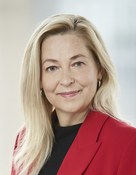Profiles of Leading Women Scientists on AcademiaNet.
Members
List of Members | Expert Search
Search among the members of the Leopoldina for experts in specific fields or research topics.

Image: BindUpPhoto.pl
Agnieszka Chacinska
| Year of election: | 2023 |
| Section: | Biochemistry and Biophysics |
| City: | Warschau |
| Country: | Poland |
CV Agnieszka Chacinska - German (PDF)
Research
Research Priorities: Mitochondria, protein transport, protein degradation, protein synthesis
Agnieszka Chacinska is a Polish molecular biologist. Her main interest is in biochemistry and the molecular aspects of cell biology. These aspects include biogenesis, transport and degradation of mitochondrial proteins, and errors in these processes which can lead to diseases. The work of Agnieszka Chacinska led to fundamental insights into the processes that contribute to the development of functional mitochondria and cellular stress responses related to mitochondrial dysfunction.
The mitochondria are cellular organelles that deliver the needed energy to cells. They consist of 1000 to 1500 cellular proteins and have a distinct DNA. The mitochondria have a key role inside the cells for both the metabolism and regulation processes. The development of mitochondria (biogenesis) is based on the import, assembly, and maturing of proteins which are all governed by specialized machineries.
Agnieszka Chacinska studies the correlation between protein transport and protein homeostasis – cellular processes that control the synthesis, folding, and degradation of proteins in a cell. Thereby she contributes to the discovery of the mechanisms responsible for the protein transport and mechanisms engaged in the recovery of protein transport failures. The research group of Agnieszka Chacinska identified and analyzed numerous proteins and metabolic pathways that participate in these processes.
A groundbreaking discovery based on the research of Agnieszka Chacinska is the role of the ubiquitin-proteasome system in mitochondrial biogenesis. With this degradation system many mitochondrial proteins in the liquid component of the cell, cytosol, are efficiently broken down before they are imported into the mitochondria.
Agnieszka Chacinska identified the cells’ responses to stress that are related to defects during the import of mitochondrial proteins. Here she was able to elucidate further regulation mechanisms including proteasomal degradation, as well as the influence of chaperones. Chaperones are proteins that aid in the correct folding of proteins and thus their proper functionality.
The goal of Agnieszka Chacinska is to better understand the complex and dynamic processes that are involved in the development of functional organelles. Furthermore, she wants to enquire into dysfunctions of cellular protein homeostasis. As these dysfunctions lead to both an accelerated aging of cells and to diseases, the knowledge thus gained is the basis for possible therapeutic developments.
Career
- since 2021 Director, IMol International Institute of Molecular Mechanisms and Machines, Polish Academy of Sciences, Warsaw, Poland
- since 2021 Professor and Leader, Laboratory of Mitochondrial Biogenesis, IMol, Warsaw, Poland
- 2017-2021 Professor and Leader, Laboratory of Mitochondrial Biogenesis, Centre of New Technologies, University of Warsaw, Warsaw, Poland
- 2017-2019 Director, Centre of New Technologies, University of Warsaw, Warsaw, Poland
- 2016-2019 Visiting Professor, Medical Center Göttingen, Georg-August-Universität, Göttingen, Germany
- 2015-2016 Deputy Director of Development, International Institute of Molecular and Cell Biology, Warsaw, Poland
- since 2014 Professor of Biological Sciences
- 2009-2016 Professor and Leader, Laboratory of Mitochondrial Biogenesis, International Institute of Molecular and Cell Biology, Warsaw, Poland
- 2008 Habilitation, Institute of Biochemistry and Biophysics, Warsaw, Poland
- 2004-2009 Group Leader, Institute of Biochemistry and Molecular Biology, Albert-Ludwigs-Universität Freiburg, Freiburg, Germany
- 2001-2004 Postdoctoral Fellow, Albert-Ludwigs-Universität Freiburg, Freiburg, Germany
- 1999 Visiting Scientist, Max Planck Institute of Microstructure Physics, Halle (Saale), Germany
- 1996-1998 Visiting Scientist, Biozentrum, University of Basel, Basel, Switzerland
- 1994-2000 PhD in Biochemistry, Institute of Biochemistry and Biophysics, Warsaw, Poland
- 1993 Master's Degree in Molecular Biology, University of Warsaw, Warsaw, Poland
- 1988-1993 Studies in Biology, University of Warsaw, Warsaw, Poland
Functions
- 2017-2019 Member, Editorial Board, FEBS (Federation of European Biochemical Societies) Journal
- 2008-2009 Associate Member, Clusters of Excellence (EXC) 294 “BIOSS Centre for Biological Signalling Studies”, German Research Council (DFG), Germany
- 2007-2010 Member, Board, Collaborative Research Centres (SFB) 746 “Functional Specificity by Coupling and Modifications of Proteins”, DFG, Germany
- Member, Board of Reviewing Editors, eLIFE, biochemistry and cell biology research fields
- Associate Editor, Cells (MDPI)
- Member, International Advisory Board, Institute of Organic Chemistry and Biochemistry, Czech Academy of Sciences, Czech Republic
- Member, External Scientific Advisory Board, Centro de Biologia Molecular Severo Ochoa, Madrid, Spain
- Member, Scientific Advisory Board, EXC 2189 “CIBSS – Centre for Integrative Biological Signalling Studies”, DFG
- Member, Advisory Board, Spemann Graduate School of Biology and Medicine SGBM, Albert-Ludwigs-Universität Freiburg, Freiburg, Germany
Projects
- since 2020 Participant, Project OPUS 17 “Effects of proteasome inhibition on mitochondrial homeostasis”, National Science Centre Poland, Poland
- since 2020 Participant, Project OPUS 18 “Molecular mechanisms modulating the function of UCH-L1 deubiquitinase in human mitochondria”, National Science Centre Poland, Poland
- 2017-2023 Leader, Project “Regenerative Mechanisms for Health”, International Research Agenda Unit (ReMedy), The Foundation for Polish Sciences, Poland
- 2016-2021 Participant, Project, MAESTRO 7 “Cross-talk between the transport of mitochondrial proteins and cellular protein homeostasis”, National Science Centre Poland, Poland
- 2009-2015 Laureate, Welcome Programme, Foundation for Polish Science, Poland
Honours and Memberships
- since 2023 Member, German National Academy of Sciences Leopoldina, Germany
- 2018 Theodor Bücher Lecture and Medal, FEBS
- since 2018 Member, Academia Europaea
- 2017 Leon Marchlewski Medal, Committee on Molecular Biology of the Cell, Polish Academy of Sciences, Poland
- 2017 Individual Award, Rector of University of Warsaw, Warsaw, Poland
- since 2016 Member, Polish Academy of Sciences, Poland
- since 2016 Member, European Molecular Biology Organization (EMBO)
- 2016 Award from the Prime Minister of Poland for Scientific Achievements, Poland
- 2016 Nicolaus Copernicus Polish-German Research Award, Foundation Polish Science (FNP), Poland, and DFG, Germany
- 2015 Award for Scientific Achievements, Ministry of Science and Higher Education, Poland
- 2015 Award for Scientific Achievements, President, Polish Academy of Sciences, Poland

